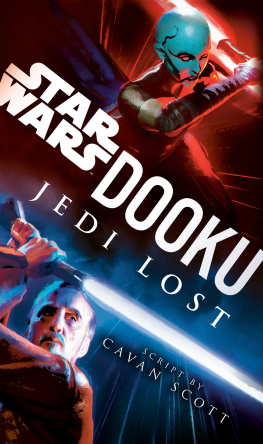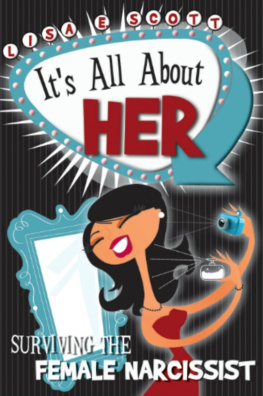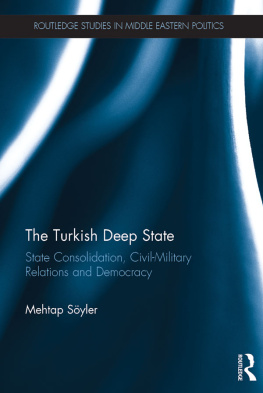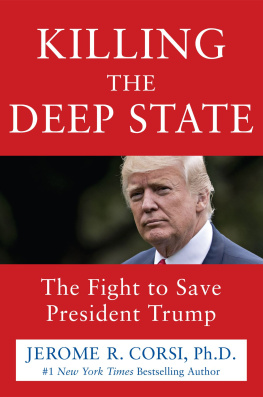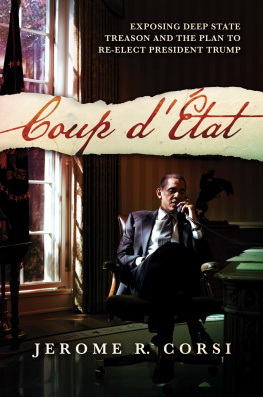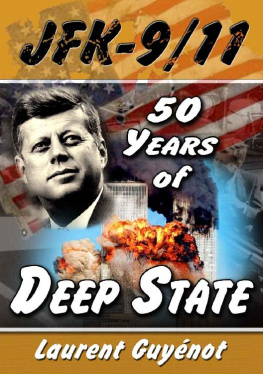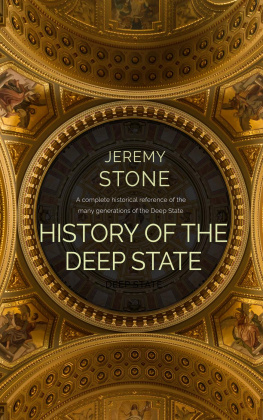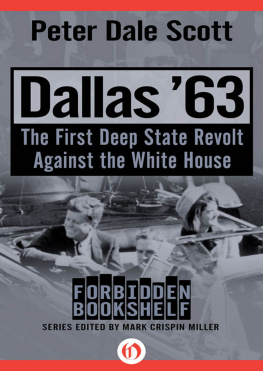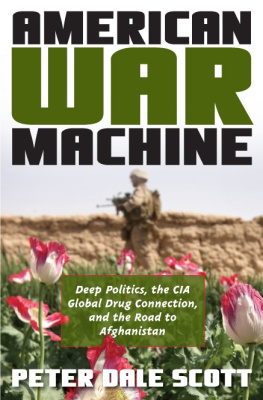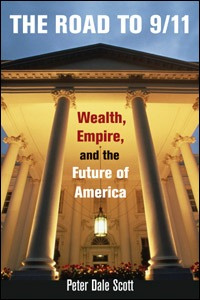About the Author
Peter Dale Scott, a former Canadian diplomat and professor of English at the University of California, Berkeley, is a poet, writer, and researcher. His diplomatic service included two years of work at the U.N. General Assembly and U.N. conferences and two years in Poland. An antiwar speaker and nonviolent activist during the Vietnam and Gulf Wars, he was a cofounder of the Peace and Conflict Studies Program at UC Berkeley.
Scotts books have been translated into seven languages, including Russian and Bahasa Indonesia. His articles and poetry have been translated into twenty languages, including Turkish, Arabic, Farsi, Chinese, and Japanese. His most recent political books are The Road to 9/11: Wealth, Empire, and the Future of America (2007), American War Machine: Deep Politics, the CIA Global Drug Connection, and the Road to Afghanistan (2010), and The War Conspiracy: JFK, 9/11 and the Deep Politics of War (2008, 2013).
Other political books have focused on war, covert operations, the politics of crime, and the international drug traffic. They include The Politics of Escalation in Vietnam (in collaboration, 1966); Deep Politics and the Death of JFK (1993, 1998); The United States and the Overthrow of Sukarno, 19651967 (published four times in Indonesian); The Iran-Contra Connection (in collaboration, 1987); Cocaine Politics: Drugs, Armies, and the CIA in Central America (in collaboration, 1991); and Drugs, Oil, and War: The United States in Afghanistan, Colombia, and Indochina (2003).
Further books on the John F. Kennedy assassination include Crime and Cover-Up: The CIA, the Mafia, and the Dallas-Watergate Connection (1977); Oswald, Mexico, and Deep Politics (1995, 2013); and The Assassinations: Dallas and Beyond (in collaboration, 1976).
Peter Dale Scott is also a poet and in 2002 received the Lannan Poetry Award. His poetry volumes include Coming to Jakarta: A Poem about Terror (1989), Listening to the Candle: A Poem on Impulse (1992), Crossing Borders: Selected Shorter Poems (1994), Minding the Darkness: A Poem for the Year 2000 (October 2000), Mosaic Orpheus (2009), and Tilting Point (2012). With Czeslaw Milosz, he translated and published the first translations into English of the Polish poet Zbigniew Herbert.
The former U.S. poet laureate Robert Hass has written (Agni, 31/32 [1990], 335) that Coming to Jakarta is the most important political poem to appear in the English language in a very long time.
Acknowledgments
I COULD NEVER HAVE FINISHED THIS BOOK WITHOUT THE GENEROUS assistance of three skilled editors: Mark Selden at Japan Focus, my French translator Maxime Chaix, and my wife Ronna Kabatznick. I also owe a great debt to the guidance and patience of my editors, Susan McEachern and Jehanne Schweitzer at Rowman & Littlefield, and to the many people who have offered me support, advice and criticism over the last few years. Among these I would particularly like to thank Daniel Ellsberg, Jonathan Marshall, Gary Aguilar, Paul Hoch, Brian Kabatznick, Rex Bradford, Jefferson Morley, David Talbot, and Karen Croft. For my thinking about the deep state in particular, I would like once again to acknowledge my general debt to Ola Tunander and Eric Wilson.
My thanks to Freeman Ng for his generous assistance and perseverance with the cover of this book. And my thanks to the copyeditor Naomi Mindlin who devoted so much labor to these pages, to my indexer PJ Heim, and to my longtime agent, Victoria Shoemaker.
My thanks and love to all my family and close friends who have suffered with me through these last four years.
My greatest debt of all can never be acknowledged enough or too often: to my wife Ronna Kabatznick, who has sustained me now for a quarter century, and given me the life I so cherish. I wish to say to her here, in the words of Hermann Hesse, If I know what love is, it is because of you.
WAR AND PEACE LIBRARY
Series Editor: Mark Selden
Protesting Power: War, Resistance, and Law
by Frances A. Boyle
Overwhelming Terror: Love, Fear, Peace, and Violence among the Semai of Malaysia
by Robert Knox Dentan
Gender, Conflict, and Peacekeeping
edited by Dyan Mazurana, Angela Raven-Roberts, and Jane Parpart
The American Deep State: Wall Street, Big Oil, and the Attack on U.S. Democracy
by Peter Dale Scott
American War Machine: Deep Politics, the CIA Global Drug Connection, and the Road to Afghanistan
by Peter Dale Scott
Drugs, Oil, and War: The United States in Afghanistan, Colombia, and Indochina
by Peter Dale Scott
War and State Terrorism: The United States, Japan, and the Asia-Pacific in the Long Twentieth Century
edited by Mark Selden and Alvin Y. So
Bitter Flowers, Sweet Flowers: East Timor, Indonesia, and the World Community
edited by Richard Tanter, Mark Selden, and Stephen R. Shalom
Biological Warfare and Disarmament: New Problems/New Perspectives
edited by Susan Wright
Zen at War, Second Edition
by Brian Daizen Victoria
CHAPTER 1 The Doomsday Project, Deep Events, and the Shrinking of American Democracy
I know the capacity that is there to make tyranny total in America, and we must see to it that this agency [the National Security Agency] and all agencies that possess this technology operate within the law and under proper supervision, so that we never cross over that abyss. That is the abyss from which there is no return.
Senator Frank Church (1975)
IN RECENT YEARS I HAVE BECOME MORE AND MORE CONCERNED WITH THE interactions between three important and alarming trends in recent American history. The first is Americas increasing militarization, and above all its inclination, even obsession, to involve itself in needless and pernicious wars. (As former President Jimmy Carter has rightly noted, The rest of the world, almost unanimously, looks at America as the No. 1 warmonger.) The second, closely related, is the progressive shrinking of public politics and the rule of law as they are subordinated, even domestically, to the requirements of covert U.S. operations abroad.
The third, also closely related, is the important and increasingly deleterious impact on American history of what I have called deep events: events, like the JFK assassination, the Watergate break-in, or 9/11, which repeatedly involve lawbreaking or violence, are mysterious to begin with, are embedded in ongoing covert processes, have consequences that enlarge covert government, and are subsequently covered up by systematic falsifications in media and internal government records.
One factor linking Dallas, Watergate, the 1980 October Surprise plot to prevent Carters reelection, Iran-Contra, and 9/11 has been the background involvement in all these deep events of personnel from Americas highest-level emergency planning, that is, Continuity of Government (COG) planning, known inside the Pentagon as the Doomsday Project. The implementation of COG plans on 9/11 was the culmination of decades of such planning, and has resulted in the permanent militarization of the domestic United States, and the imposition at home of institutions and processes designed for domination abroad.
Writing about these deep events as they occurred over the decades, I have been interested in the interrelations among them. It is now possible to show how each was related both to those preceding it, and those which followed.
In this chapter, I would like to go still further, and propose a framework to analyze the ongoing forces underlying all of the most important deep events, and how they have contributed to the political ascendance of what used to be called the military-industrial complex. I hope to describe certain impersonal governing laws that determine the sociodynamics of all large-scale societies (often called empires) that deploy their surplus of power to expand beyond their own borders and force their will on other peoples. This process of expansion generates predictable trends of behavior in the institutions of all such societies, and also in the individuals competing for advancement in those institutions. In America it has converted the military-industrial complex from a threat at the margins of the established civil order, to a pervasive force dominating that order.



